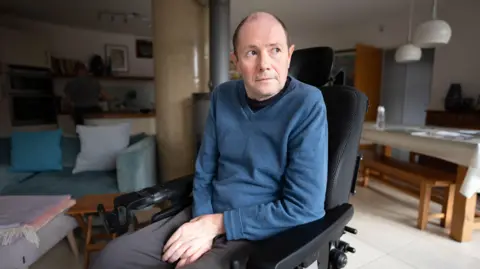MND sufferer backs amendment to assisted dying bill
 PA Media
PA MediaA father with motor neurone disease (MND) has urged MPs to press ahead with changes to the law on assisted dying.
A committee of MPs is expected to consider amendments to the Terminally Ill Adults (End of Life) Bill in the coming weeks.
Phil Newby, 54, from Rutland, has MND and previously failed in a High Court case calling for a judicial review of the current law, which makes it an offence to help another person end their life.
He said: "I'm unlikely to benefit from a change in the law, even if it's passed through the Houses of Parliament – which I hope it will be, I'll be delighted if it is - will take two, maybe three years to come into effect."
Liberal Democrat MP Tom Gordon has proposed an amendment to the bill, which would allow people with neurodegenerative illnesses such as MND to request assisted dying when they are estimated to have 12 months left to live.
The change would extend the eligibility for people with neurodegenerative illnesses to a year from the currently proposed six months.
Mr Newby said the change would be a "very wise and sensible thing to put into our law".
He added: "The neurological diseases come with the very high risk of a cognitive decline in the later stages.
"This means that very often, within the last six months of their lives, people with neuro illnesses, with brain illnesses, become ineligible for an assisted death.
"And they are some of the people who need an assisted death perhaps the most, the people who, for decades now, have gone to court begging for help from the system."
'Relentless deterioration'
Mr Newby was diagnosed with MND in 2014.
He had lost the ability to walk and use his hands and lower arms by 2019, when he took his case for change to the High Court.
The former environmental consultant had his appeal refused by judges, who said the court was "not an appropriate forum for the discussion of the sanctity of life".
Mr Newby said he has since suffered a "slow and very relentless deterioration in his condition and now has "less use of my limbs, problems with breathing and swallowing".
He lives at home with his his wife and spends long periods on a ventilator and is looked after by carers almost 24 hours a day.
Mr Newby believes any change in the law will come too late for him, but added: "I'll never say never, but the satisfaction of seeing a really antiquated, out-of-date and, frankly, cruel bit of legislation from the past replaced by something much better, would be really satisfying."
Campaign group Care Not Killing has said the amendment to widen eligibility for some "shines a spotlight on the dangers of legalising state-assisted killing, as once politicians say there are some lives not worth living it is only a matter of which conditions and illnesses are included".
Amendments to the bill will be discussed by the 23-member scrutiny committee in the coming weeks.
If you have been affected by the contents of this story, you can visit the BBC Action Line website.
Follow BBC Leicester on Facebook, on X, or on Instagram. Send your story ideas to [email protected] or via WhatsApp on 0808 100 2210.
